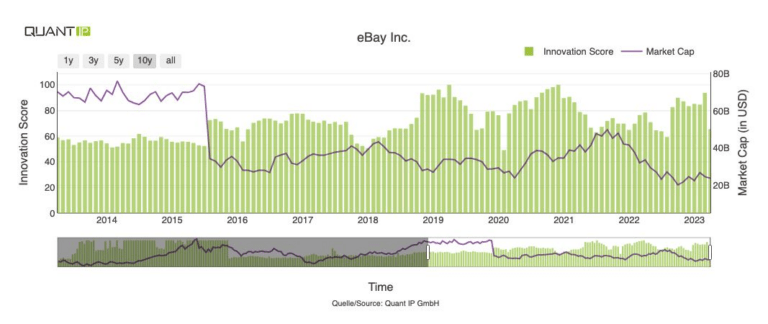Innovation Investment of the Week: Rakuten – a favourable driver of innovation
Despite tough times in ecommerce the Japanese company Rakuten is still growing at a double-digit rate. A good time to get in, as the share is cheaper than it has been for a long time and boasts a top IP Quant Innovation Score.
From mobile phone offers to e-commerce platforms to the largest Japanese internet bank, Rakuten, founded in 1997, has built up a considerable product portfolio and expanded it in recent years through strategic acquisitions and partnerships. to further expand its position Rakuten spends lots of money on research and development. While the R&D-spendings have been consistently between 80 and 90 million dollars/year in recent years, it clearly exceeded the 100 million dollar mark in March 2022 and was most recently over 130 million dollars. That pays off: The number of inventions in 2022 was over 250 – almost twice as high as the year before, around half of them with a Quant IP Rating of AAA or AA. The Quant IP Innovation Score also increased: While three years ago it was still below 30, it’s currently at 100 – the highest value possible!
It is primarily in the areas of e-commerce and mobile commerce that Rakuten is registering patents and inventions. Above all, the prediction of user behavior and targeted guidance of purchasing interests by means of data analysis and machine learning are priorities for the Japanese company and have the potential to outpace the competition.
The development of sales revenues in recent years shows that the strategy could pay off. In the past five years, they have almost doubled and amounted to about 1.9 trillion yen (about 14 billion dollars) in 2022. However: expansion into new markets, the extension of business areas and the constant improvement of products – all this is costly. The company has been posting losses since 2019 – and is highly indebted; the debt stands at almost 96 percent.
Rakuten’s failure to grow profitably has been severely punished by investors. The share price plummeted significantly from March 2021 onwards, losing around 60 per cent of its value. Currently, a share costs as much as it last did in 2012, when sales amounted around 440 billion yen – only a fifth of today’s value. Nevertheless, since June last year the decline in value seems to have stopped and the share is moving sideways. Shareholders are thus pinning their hopes on the fact that the increased R&D spending will provide further innovation impulses that will push the company back into the profit zone in the medium to long term and give the share price a boost.
Conclusion: If the company’s strategy of gaining decisive competitive advantages through innovation works out, the share should gain momentum again. Especially in view of the favourable valuation with continued good sales development and a high Quant IP Innovation Score, the share is very attractive.
More about patents & investing: info.quant-ip.com/content


